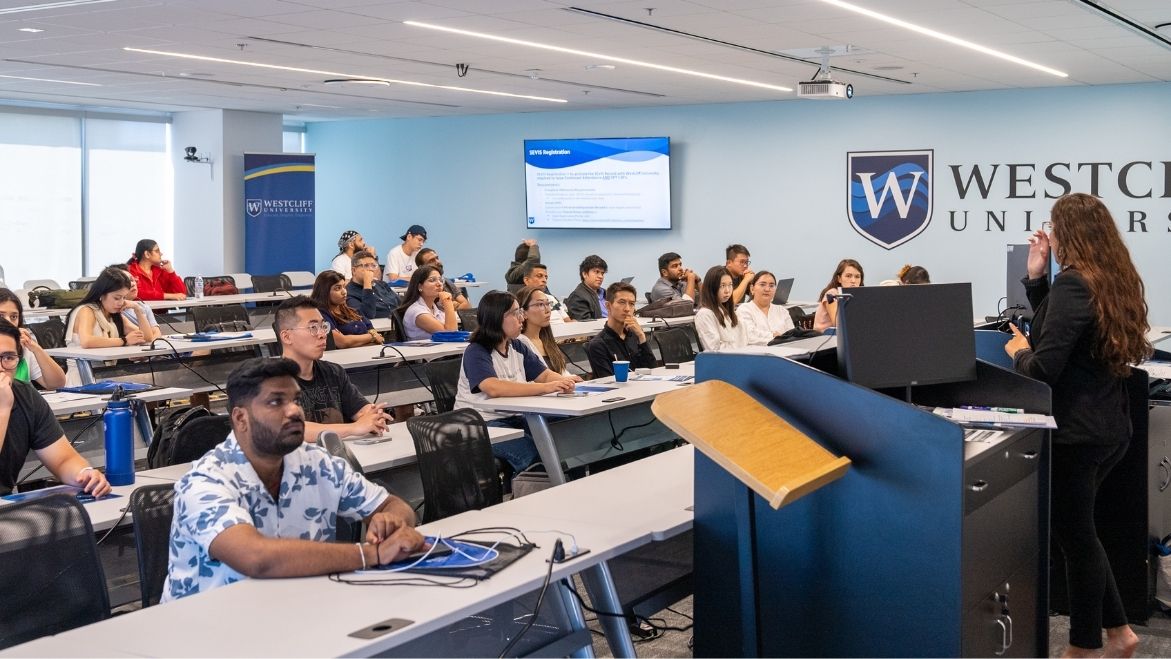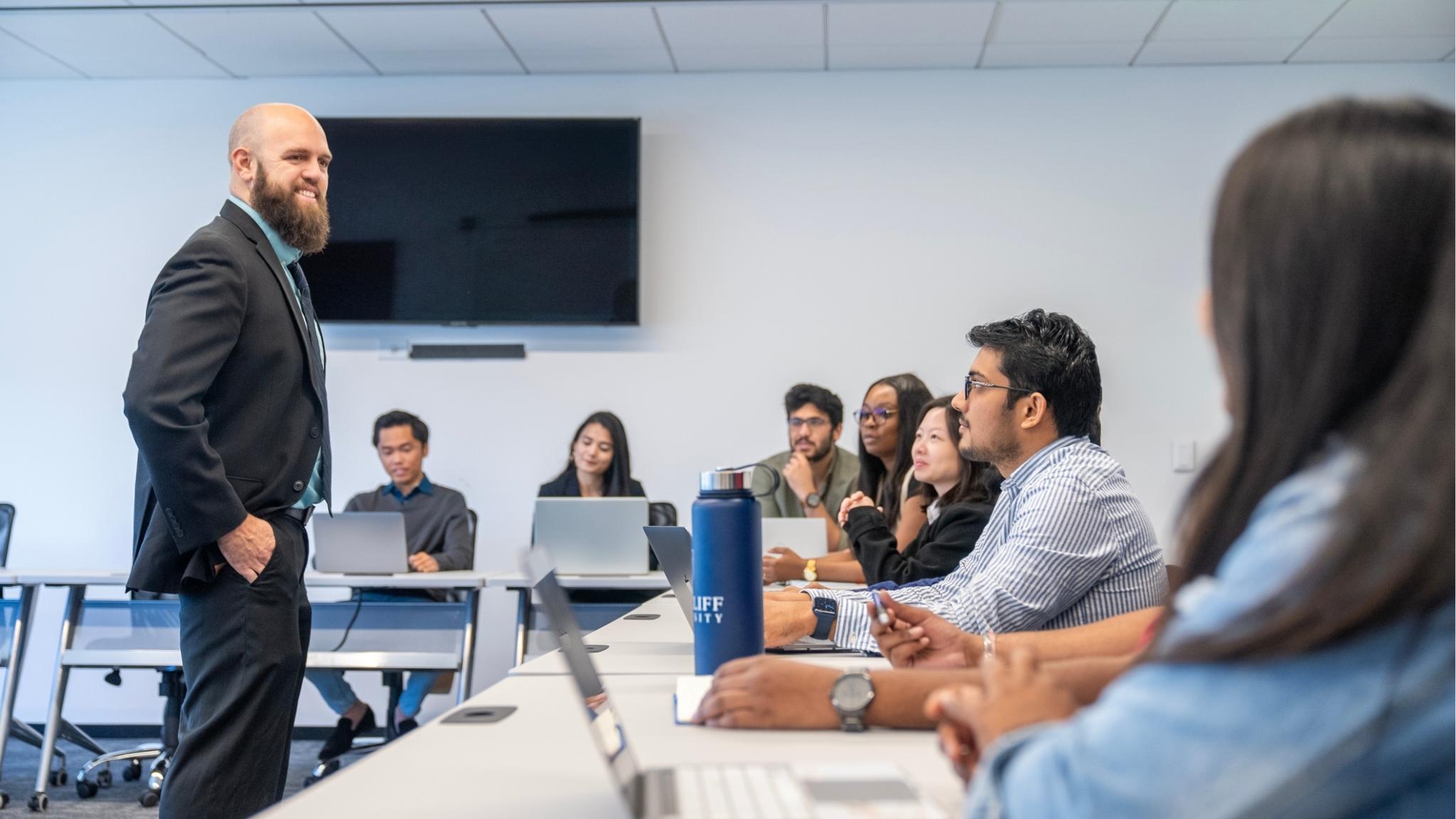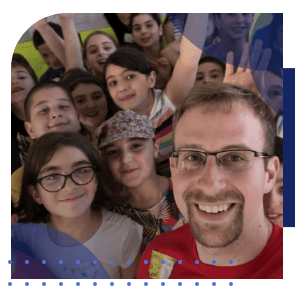This is a guest post contributed by Bridge’s M.A. TESOL university pathway partner, Westcliff University.
In a diverse world of English language teaching and learning, many pathways and specializations offer educators valuable opportunities to focus their skills and passions. Just as doctors specialize in different types of medicine, English teachers can diversify their choices. An educator who is passionate about an aspect of English teaching or inspired by new content can upskill in those areas to become more specialized.
If you’re new to teaching, you’ll want to get initial training and qualification with a TEFL certificate. You can explore our online TEFL courses and get started!
As English teachers grow professionally, they constantly seek new challenges to meet their students’ needs. Specializing in MA TESOL directly addresses the critical need for preparing students and teachers for the 21st-century global market.
English language learners pursuing higher education must be equipped not only with strong language proficiency but also with the analytical skills essential for professional success. As students transition into university degree programs, teachers need to instruct in specializations such as:
-
English for Academic Purposes (EAP): academic reading, writing, and study skills.
-
Intensive English Programs (IEP): Intensive routes that accelerate language learning.
-
English for Specific Purposes (ESP): Language for specific fields, like business, engineering, or nursing.
At institutions like Westcliff University, students are equipped with the necessary tools and resources for success beyond university. Specializing in English enables career advancement into multifaceted professional roles such as university or corporate instructor, curriculum designer, or academic coordinator. These TESOL specializations collectively prepare students for the rigor and expectations of higher education, with transferable skills that also ensure long-term success in their chosen careers.
Raise your level of professionalism with
Specialized Certification in Teaching Business English
Get CertifiedEnglish for Academic Purposes: A foundation for university success
English for Academic Purposes is a specialization that prepares learners for the unique demands of higher education. Courses go beyond general English instruction, recognizing that academic success requires specific skills, including an understanding of academic culture and effective study habits.
Students prepare to master academic reading and writing, develop critical and digital literacy, learn effective study skills (e.g., time management, learning strategies, academic note-taking), and follow academic conventions and integrity policies. Additionally, students need practical skills, like using the university’s learning management system (LMS) and participating in online discussions.
EAP teaches skills (reading, writing, listening, and speaking) while helping students with their studies.
-
Reading in EAP navigates complex academic research articles, and teachers model real reading strategies like THIEVES (to preview structure and purpose), skimming, and scanning so students can tackle academic texts more confidently.
-
Writing becomes formal and objective, using structured arguments over idioms and contractions. Students practice organizing essays, developing arguments, and creating citations and references in different formats.
-
Listening development includes mastering strategies for understanding lectures, effective note-taking techniques (e.g., the Cornell method), active listening, identifying main ideas, and discerning between a speaker’s purpose or argument.
-
Speaking is practiced through academic discourse and discussions, emphasizing clarity and formality through specialized vocabulary to convey complex ideas. Presentations and timed speaking projects help build confidence and fluency.
-
Vocabulary instruction shifts from high-frequency word lists to the Academic Word List, giving students access to specialized vocabulary for university courses.
Westcliff’s EAP courses are offered in different formats to meet diverse student needs. They may include pre-sessional courses before degree programs, integrated courses within programs, and specialized courses for business or engineering, for example.
The Westcliff University REAL Intensive English Pathway Program exemplifies the practical application of EAP principles by using differentiated instructional methods to foster critical thinking and analytical skills. As a result, students practice and independently use their newly acquired strategies, effectively addressing the diverse needs of English language learners in higher education.
EAP is a vital TESOL specialization that provides international students with essential linguistic and academic tools for higher education. It acknowledges students’ diverse backgrounds, languages, and prior learning experiences, emphasizing compassion and empathy to create a supportive, learner-centered environment with individualized support that facilitates the transition to higher education.
Need help with distinguishing TEFL and TESOL?

Intensive English programs: Aiming for academic success
Intensive English programs provide students with varied skills. Some students may need research skills essential to academic success, while others want to learn communication skills and specialized vocabulary for everyday interactions. Some may aim at achieving conversational fluency and cultural understanding.
Research projects reinforce key academic competencies, such as finding credible sources, applying critical thinking, citing sources properly, synthesizing information, and developing grammar and vocabulary skills.
The IEP at Westcliff University is specialized to demystify the research process for students enrolling in a degree program in the United States. Students will learn:
-
How to search for peer-reviewed articles using library databases.
-
Strategies to identify effective keyword searches and evaluate credible sources.
-
How to find and read academic-level articles from university library databases – a foundational step toward moving students away from using search engines to find non-credible sources.
-
How to summarize or paraphrase information ethically and accurately without plagiarizing. Skillful synthesis of sources deepens understanding and strengthens arguments.
-
How to create annotated bibliographies (for graduate and doctoral-bound students).
Brainstorming and outlining strategies help students organize ideas. A process-based approach to writing includes teaching the introduction, body, and conclusion, as well as how to cite sources. Students should submit multiple drafts reviewed by professors, tutors, and the writing center to introduce students to university academic support services.
Participating in peer-editing exercises teaches strategies for effectively revising drafts. At the conclusion of their project, students present their research to the class.
International students with little exposure to American research norms face challenges in understanding academic honesty. International students generally understand the ethical implications of plagiarism; however, having only intermediate English proficiency increases the temptation for non-native speakers navigating an advanced skill that requires near-native competence.
While most students do not intentionally cheat, some unwittingly use translation or AI unethically to keep up with the demands of their programs. At the master’s and doctoral levels, students are held more accountable. Exposure to research skills, the capability to navigate university resources, and the ability to cite and evaluate credible sources, and to synthesize information are vital for academic success.
Tackling these challenges in an IEP program equips international students with strategies, resources, and tools crucial for academic and professional success.
Are you ready to enter the TEFL job market? Learn how to enhance your resume with these resources.
Kickstart your English language teaching career with
Professional TEFL/TESOL Certification
Get CertifiedEnglish for Specific Purposes: From the classroom to the workplace
ESP aims to align language learning with real-world tasks while opening doors to professional growth and cross-cultural collaboration. For English language learners in business programs, integrating language instruction with relevant business content provides an authentic learning experience.
Effective instructional methods combined with highly qualified faculty promote a learning environment that builds language and content knowledge. At Westcliff, learners will:
-
Use texts that reflect current trends, case studies, and leadership practices to offer learners both linguistic and cultural insight into the world of business.
-
Gain an understanding of how English is used in professional settings by exploring a variety of topics in marketing, finance, management, innovation, and entrepreneurship, building cross-disciplinary vocabulary, and exploring areas of personal or professional interest.
-
Build autonomy to select from a variety of interests and texts, and are supported in developing critical reading skills.
-
Practice using information literacy techniques (such as skimming for main ideas, scanning for details, and interpreting tone and intent) not only in academic settings, but also in the workplace.
One of the primary challenges for language learners in business programs is mastering the specialized vocabulary. Essential skills to reinforce vocabulary acquisition include: previewing key terms, predicting meanings from context, annotating articles, underlining unfamiliar expressions, and using strategies such as word analysis (prefixes, suffixes, roots) to decipher meanings. These provide opportunities for active language production, which is essential for long-term learning.
Business English education is not just about acquiring knowledge. It’s about developing the ability to analyze situations, weigh options, and make informed decisions. Teaching students how to verify sources, identify bias, and distinguish opinion from fact is essential.
Fostering data-driven decision-making and media literacy, including charts, graphs, and infographics, serves as a bridge between literacy and numeracy skills. Students interpret visual data, summarize trends, or relate data points to textual content.
By engaging in structured activities that target vocabulary, comprehension, critical thinking, and practical use, learners build not only linguistic competence but also the analytical skills needed for professional communication. When language learning is integrated with business-focused content, students are given authentic opportunities to develop domain-specific vocabulary and apply their knowledge in meaningful, real-world business contexts.
Learn strategies to avoid English teacher burnout and stay on track to success.
Specializing in TESOL
Pursuing specialized knowledge is a necessity to remain effective in an ever-evolving landscape. Learning new skills becomes paramount. Developing professionally as an instructor elevates your teaching skills and expands your areas of expertise. Discovering the latest trends through specialized courses impacts student achievement.
Lifelong learning contributes beyond the classroom and prepares students for the workplace.
The specialized focus on EAP, IEP, and ESP within an MA TESOL program is not merely an elective concentration but a direct and strategic response to a critical need in global higher education. The driving force behind the why is the growing demand for specialists.
Consequently, MA TESOL graduates with expertise in specializations are uniquely positioned to meet this demand. They are equipped with the essential pedagogical skills and cultural insights to bridge the gap between language proficiency and academic excellence, thereby becoming indispensable agents in empowering the academic community as a whole.
Ready to explore the pathway to an M.A. in TESOL? Enroll in the Bridge 150-hour IDELTOnline™ to pave the way to an advanced degree and career success.

Dr. Jodi Consten is currently the Dean for the College of Education at Westcliff University. With more than 25 years of educational experience, Dr. Consten enjoys collaborating with industry experts to deepen learning, foster innovation, and transform leadership.

Sean Dailey has nearly two decades of experience in EFL education and teacher training. With degrees from UC Riverside and CSU San Bernardino (M.A. Education – TESOL), Sean has taught students from kindergartens to graduate schools and conducted virtual teacher trainings in the U.S., Ukraine, and Uzbekistan. He has volunteered significant time to supporting English teachers in KoreaTESOL and ENGin. Having resided and learned languages in North America, Asia, and Europe, he currently leads the REAL intensive English program at Westcliff University and enjoys traveling and surfing. Research interests include teacher education, critical pedagogy, CALL, and accessible ELT for all.

Eric Peterson is the Head of REAL (Reimaging English as an Additional Language) at Westcliff University. REAL is an Intensive English program. Eric has taught English for over 17 years in Denmark, Turkey, Ukraine, and the United States at the university level. He served as a United States Peace Corps volunteer in the University TEFL program in Ukraine.






